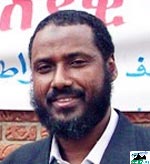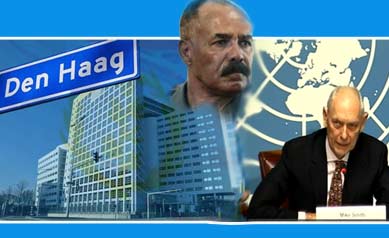Eritrea And Its Unusual Embassies
![]()
Question by Swedish Journalist, Donald Boström: Given what you said, have you thought about closing your embassy in Sweden and leave Sweden?
Answer by Eritrean president, Isaias Afwerki: I care more about our Eritrean group in Sweden, which is large and active, than on our embassy. Why do we need an Embassy? But it would probably be considered bad if we closed the embassy. An embassy has after all a job to do. But Sweden will disappear slowly away from our consciousness.
In the above exchange, translated from its original Swedish version (available at http://www.aftonbladet.se/nyheter/dawitisaak/article7933904.ab), readers can glean an insight into the fact that the Eritrean government sees the role of embassies not as a way to enhance bilateral relationships or even protect the expatriate citizens who live in the host country, but as a way to facilitate a client/customer relationship between the Eritrean government and “our Eritrean group”
The Eritrean embassies throughout the world are used by the Eritrean government as a means to ensure that the Eritrean Diaspora remain loyal to the Eritrean government. Representatives of the Eritrean government conduct periodic “seminars” to inform Eritreans of “developments” and to update them on the friends and enemy list of the ruling party; to promote tourism, and, importantly, to collect 2% tax payments and other funds mandated in “binding resolutions.” The Eritrean government has little regard for the rules of the host country and actively encourages “our Eritrean group” to break them.
Eritrean Embassies In the United States
The United States has several outstanding issues with the Eritrean government: (a) the 9-year long disappearance of Ali Alamin Ali and Kiflom Gebremichael, two Eritrean employees of the US Embassy in Eritrea; (b) the opening and inspection of diplomatic pouches (in violation of the Vienna Convention on Diplomatic Relations) of the US Embassy in Eritrea and (c) the Eritrean government’s role in destabilizing Somalia.
In retaliation, the US authorities closed the Eritrean consular offices in Oakland, California, and have restricted the movement of the Eritrean ambassador to a 25-mile radius of the Eritrean Embassy in Washington, DC.
Since 1993, there have been six US Ambassadors to Eritrea (the typical term is 3 years) and long gaps between the termination of the mission of one ambassador and his replacement have not been unusual:
| Ambassador | Credentials Presented | Mission Terminated |
| Robert Houdek | 12/93 | 9/96 |
| John Hicks | 9/96 | 5/97 |
| William Clarke | 8/98 | 8/01 |
| Donald McConnell | 10/01 | 7/04 |
| Scott DeLisi | 10/04 | 6/07 |
| Robert McCullen | 10/07 | 7/10 |
During the same time, there have been only four Eritrean ambassadors to the United States: Andemichael Kahsai, Semere Russom, Girma Asmerom, and Ghirmai “Santim” Ghebremariam.
For a few years after the independence of Eritrea, Hagos “Kisha” Gebrehiwet, stayed as a de-facto ambassador of Eritrea in DC until he was given the position of the chief bag man of the Eritrean government running the myriad of commercial, industrial, transportation, construction and financial interests of the government.
Eritreans who are permanent residents of the United States (or have dual citizenship) do not require any services from the Eritrean embassy in the US. But if they have to travel to Eritrea or if they want to settle any affair (buying a house, transfer of ownership, hiring attorneys-at-law, flying deceased family members for burial in Eritrea), they are required to “fulfill their national obligation” which includes paying 2% of net income (in arrears, if necessary, all the way to 1993) as well as other government mandated fees. The imposition of the 2% tax applies to any income, including social security or welfare checks. (Refer to instructions here: http://www.embassyeritrea.org/taxation.htm)
Eritrean Embassy In Sweden
Abdulrahaman Totil, Osman Goolay and Mohmmed Ali Beshir were employed by the Eritrean embassy in Sweden—until recently. That is when the Swedish government asked the Eritrean government to pay payroll taxes on the three individuals—who were receiving cash wages. Rather than complying with Swedish law, the Eritrean government refused to give the Swedish authorities records of its local employees, and it terminated their employment.
According to our sources, the three individuals were claiming to be unemployed and receiving unemployment benefits from the Swedish government and they may now be liable for penalties.
Eritrean Embassy In Lebanon
 The State of Eritrea does not have an ambassador to Lebanon. It has an “honorary ambassador” in the person of Mr. Abdullah Ghassan Matraji. And what qualifies Abdullah Ghassan to be an ambassador? His father, Ghassan, who happens to be an arms dealer, is a “friend of Eritrea.” Abdullah himself is not too shabby: he has real estate holdings and owns a telecommunication company in Africa and he hopes to benefit greatly from the Eritrean gold rush.
The State of Eritrea does not have an ambassador to Lebanon. It has an “honorary ambassador” in the person of Mr. Abdullah Ghassan Matraji. And what qualifies Abdullah Ghassan to be an ambassador? His father, Ghassan, who happens to be an arms dealer, is a “friend of Eritrea.” Abdullah himself is not too shabby: he has real estate holdings and owns a telecommunication company in Africa and he hopes to benefit greatly from the Eritrean gold rush.
Eritrean Embassy In Italy
 Eritrea’s honorary ambassador in Milan, Italy, is Jean Pier Prosperini. He is “also suspected of brokering arms deals with Eritrea, which like Iran has been accused of supporting Islamic extremist groups,” According to Italian sources.
Eritrea’s honorary ambassador in Milan, Italy, is Jean Pier Prosperini. He is “also suspected of brokering arms deals with Eritrea, which like Iran has been accused of supporting Islamic extremist groups,” According to Italian sources.
Check a Youtube clip to see Prosperini’s defense of the Eritrean government.
Eritrean Embassy In Saudi Arabia
Eritreans cannot live and work in Saudi Arabia unless they have Iqama, residence permit, provided by a Saudi company (if they are working for a company) or a sponsorship by a Saudi citizen (if they are self-employed), and a valid passport. The Eritrean government has exploited this law to bilk huge sums of monies from Eritrean citizens. First, it has mandated that they may not have their passports renewed unless they fulfill their “national obligations” which includes paying fees that are arbitrary. In the capital, Riyadh, the income tax on Eritreans is 3%, while in Jeddah it is 2%. Then there are additional “obligations” which are tacked on including “national defense fund”, “martyr’s fund”, etc. Secondly, to ensure regular compliance, the government has changed all its passports (requiring them to get new ones at exorbitant fees) and shortened the validity of the passports (to ensure that the Eritrean visits to the embassies are more frequent.)
The Eritrean Embassy in Kuwait
For a long period beginning in 1998, the Eritrean embassy in Kuwait was selling Eritrean passports to stateless persons in Kuwait. At the time, Ahmed Ali Burhan was ambassador until he was recalled to Asmara and frozen for a long time. A few years ago he was rehabilitated and became a liaison officer to the Somali groups opposed to the Somali government—he was born and grew up in Somalia . Two ambassadors were assigned following Ahmad Ali Burhan. Ambassador Mohmoud Churum was the last resident ambassador in Kuwait before the embassy was closed. Last summer, Mahmoud Churum abandoned his post and applied for asylum in Canada.




Awate Forum